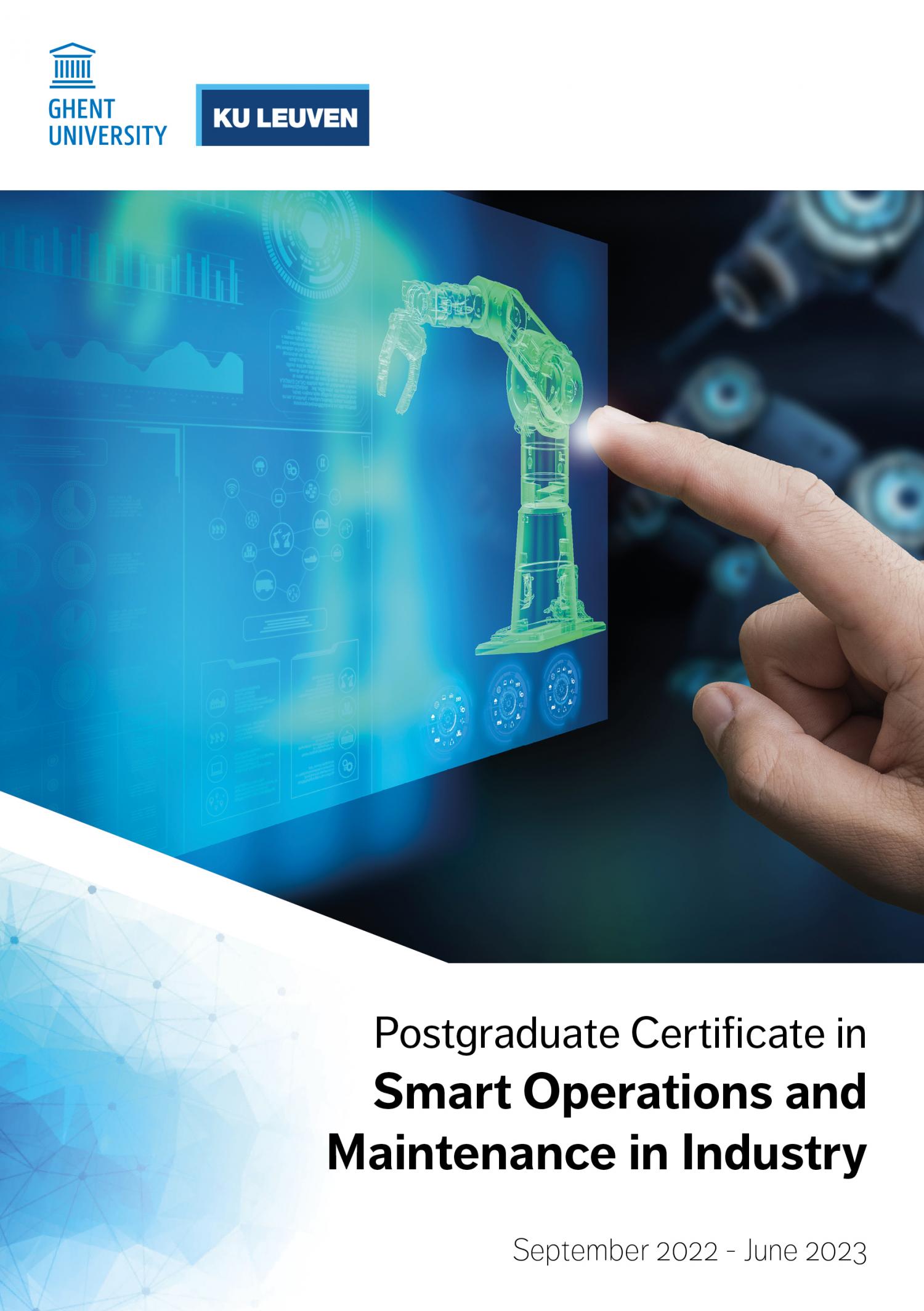Smart Operations and Maintenance in Industry
Beschrijving
The programme focuses on the most relevant and essential industry 4.0 (I4.0) technologies and concepts related to operations and maintenance, for an industrial production context.
You learn how both operational and maintenance processes can be optimised by making them ‘smart’, using new (I4.0) technologies, such as robotics, big-data analytics, digital twins, cloud computing, etc. The programme covers technologies that facilitate an advanced digitalisation of product and process information (e.g., smart sensors), technologies that are used in production and maintenance (e.g., cobots), and technologies that connect production equipment/assets and people (e.g., Industrial IoT platforms).
This postgraduate programme is jointly organised by Ghent University and KU Leuven. It stands firmly on its own, but also opens the door to more. The programme forms an integral part of the upcoming Advanced Master of Science in Smart Operations and Maintenance in Industry (expected in 2023), in which students will be able to register for one of three in-depth and hands-on elective tracks, and further improve themselves as Smart O&M specialists. Participants who successfully complete the courses in the postgraduate programme will be granted exemptions in pursuing the homonymous advanced master’s degree.
Programma
High computing power at low costs, reliable and high bandwidth sensorisation and communication, and new computational modelling techniques have enabled us to simulate the physical world in a virtual one. It has led to the Digital Twin concept, a virtual replica that acts identically as a physical asset and remains synchronised with the asset during the lifecycle.
This opens up a plethora of possibilities, e.g. it can be used to optimise system parameters on the fly, to check the system’s condition live, or to virtually explore future design improvements. Through lectures and illustrative use cases, this course gives students an in-depth view on how to define a Digital Twin, its essential building blocks, and how to validate and use it to create added value in an industrial setting.
Monitoring & Prognostics (6 ECTS)
One of the key methods to improve industrial processes is an enhanced usage of current machinery. By monitoring the physical signals emitted by machine elements, it is not only possible to distinguish between a healthy and faulty machine, but also to predict when failing would occur.
Monitoring and prognostics optimise the need for replacement parts, reduces maintenance efforts, and increases machine reliability, which in turn makes factory maintenance and management easier, more efficient and more cost effective.
Through theoretical lectures, real-life cases and practical applications, students learn which physical signals are the most relevant, how to detect, acquire and analyse them, and how to relate these signals to potential failure.
Operations Management Strategies (6 ECTS)
This course introduces students to the complex world of management strategy formulation for one of the main domains of a manufacturing company, i.e. operations. The course describes the components and drivers for operations management in a contemporary business context. Challenges are identified and the role of new and emergent smart technologies is explored.
The course zooms in on production and maintenance, two important pillars in operations management.
Students learn about the different types of strategies possible for both production and maintenance, its essential concepts and opportunities, historical evolutions as well as the outlook. The course also teaches how to follow up performance, since it is imperative for all businesses to have quantitative tools to measure, monitor, check and predict the performance of their operations management.
New technological evolutions are drastically changing the way factories can and need to operate. The so-called “smart factories” have a highly digitalised shop floor that continuously collects and shares data through connected devices, machines, and production systems. These data can be used to (self-)optimise operations and to proactively address issues, improve manufacturing processes and respond to new demands by tapping the built-in reconfiguration potential.
Students learn how to design factories in a smart way, and how factories can be re-designed to become smart. A lot of digital tools are available to support factory design processes based on 3D digital models, which are virtual replicas of the (envisioned) real factory and can evolve towards digital twins in the operational phase to facilitate decision-making (e.g., what-if scenario analysis).
Schrijf je hier in voor lessen uit deze cursus
Postgraduate Certificate in Smart Operations and Maintenance in Industry
Postgraduate Certificate
- Upcoming programme: 27 Sept. 2022 – 16 May 2023, excluding the final examination period.
- English
- Tuesdays from 15:00 until 20:45
- Thursdays from 12:30 until 18:00
- On campus, in a hybrid setting or online
- Two locations:
- KU Leuven Bruges Campus
(first semester) - Ghent University Campus Kortrijk
(second semester)
- KU Leuven Bruges Campus
The programme contains 24 ECTS. After successful completion of the programme, you receive the Postgraduate Certificate: Smart Operations and Maintenance in Industry, awarded by KU Leuven and Ghent University.
Monitoring & Prognostics (6 ECTS)
Operations Management Strategies (6 ECTS)
More info: https://smart-om.eu/
